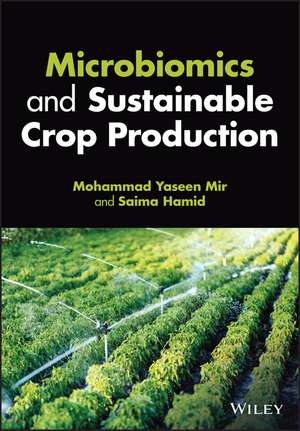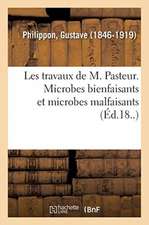Microbiomics and Sustainable Crop Production
Autor MY Miren Limba Engleză Hardback – 17 apr 2023
Preț: 1013.63 lei
Preț vechi: 1316.41 lei
-23% Nou
Puncte Express: 1520
Preț estimativ în valută:
193.96€ • 202.92$ • 161.12£
193.96€ • 202.92$ • 161.12£
Carte disponibilă
Livrare economică 12-26 martie
Preluare comenzi: 021 569.72.76
Specificații
ISBN-13: 9781119799313
ISBN-10: 1119799317
Pagini: 336
Dimensiuni: 160 x 238 x 24 mm
Greutate: 0.95 kg
Editura: Wiley
Locul publicării:Chichester, United Kingdom
ISBN-10: 1119799317
Pagini: 336
Dimensiuni: 160 x 238 x 24 mm
Greutate: 0.95 kg
Editura: Wiley
Locul publicării:Chichester, United Kingdom
Notă biografică
Dr Mohammad Yaseen Mir, Centre of Research for Development, University of Kashmir, India. Dr. Mir's research interest is in studying the ecology, molecular biology, conservation, and management of plant resources. Dr Saima Hamid, Researcher, Department of Environmental Sciences, University of Kashmir, India. Dr. Hamid researches plant stress biology, genetic diversity of high altitudinal medicinal plants, and more.
Cuprins
Chapter 1 Agricultural Microbiomes: Functional and Mechanistic Aspects
1.1 Introduction
1.2 Model microbiome-plant systems
1.3 Stability, resilience and assembly of agricultural microbiomes.
1.4 Core plant microbiome and metagenome.
1.5 Interactions among the microbes, environment and management.
1.6 Microbiome Innovation in Agriculture: Insect Pest Management
Chapter 2 Engineering and Management of Agricultural Microbiomes for Improving Crop Health
2.1. Why to modify plant microbiome.
2.2. Methods for detecting endophytes within the plant
2.3. Engineering of the plant microbiome
2.4. In situ harnessing of agricultural microbiome
2.5. Future perspective of agricultural microbiome engineering
Chapter 3 Approaches and Challenges: In Agricultural Microbiome Research
3.1. Microbiome research in the omics era
3.2. New efforts and challenges in assigning function to microbes
3.3. Characterization of Complex Microbial Communities
3.4. Advanced fundamental research on microbe-microbe and plant- microbe interactions (Bridging the lab-field gap).
Chapter 04 Perceptive of Rhizosphere Microbiome
4.1. Introduction
4.2 Mutiple level selection in plant rhizosphere.
4.3 Experimental setup and network analysis
4.3.1 Observation of microbial control over plant phenotypes using -Omics- Techniques.
4.3.2 Genome editing techniques to reveal plant host controls.
4.4. Rhizosphere Engineering and Sustainable Agriculture
4.5. Emerging approaches in rhizoremediation.
4.6. Heritability of rhizosphere microbiome
4.7. Future course of orientations
Chapter 5 Microbial Communities: In Phyllosphere
5.1. Introduction
5.2 Diversity of microbes in phyllospheric environment
5.3. Microbial adaptation to the phyllosphere
5.4. Relationship between phyllosphere microbial communities and functional traits of plants
5.5. Metabolic Dynamics of Phyllosphere Microbiota
5.6. Impact of Phyllospheric Microorganisms on Plant-Plant, Plant-Insect Herbivory, and Plant-Atmosphere-Chemical Exchanges
5.7. Quorum Sensing in Phyllosphere
5.8. Applications for phyllosphere microbiology.
Chapter 6 Endosphere and Endophyte Communities
6.1. Reproduction and Transmission Modes of Microbes
6.2. Vertical Transmission
6.3 Endophyte Genomes and Metagenomes
6.4. Advanced Fundamental Research on Microbe Interactions in the Endoshpere
6.5. Bacteria and Fungi in Mixed Biofilms in Plants
6.6. Conclusions and Future Perspectives
Chapter 7 Core Microbiomes: For Sustainable Agroecosystems
7.1. Core microbiome for agriculture: A taxonomic and functional aspect
7.2. Core microorganisms and priority effects in initial assembly.
7.3. Informatics of microbial networks
7.4. Criterion for nominating core microorganisms
7.5. Designing core microbiomes.
7.6. Management of agroecosystems with core microbiomes.
Chapter 8 Microbiome Mediated: Stress Alleviation in Agroecosystems
8.1. Effect of biotic and abiotic stresses on plants.
8.2. Molecular and physiological responses of plants against stresses.
8.3. Microbiome mediated mitigation of stress conditions.
8.4. Multi-omics strategies to address stress alleviation








